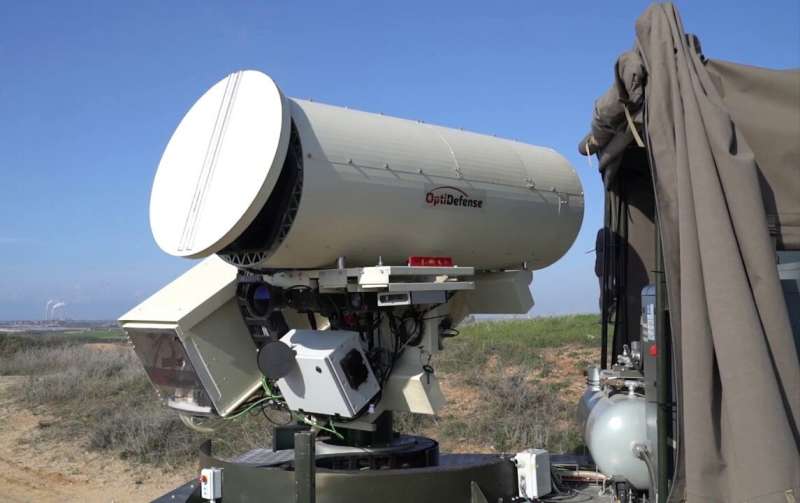Team develops new laser defense system against autonomous drones

A Ben-Gurion University of the Negev researcher has developed a laser-based defense system to defend against the next generation of autonomous attack drones in a wide range of homeland security settings.
Laser expert Prof. Amiel Ishaaya, deputy dean, BGU Faculty of Engineering Sciences, together with two industry associates, developed the new Light Blade system (Lahav-Or in Hebrew). The technology is being developed and commercialized in their new company, OptiDefense.
A basic version of Light Blade deployed by Israel's Border Police and paired with Elbit's SupervisIR threat detection system downed an unparalleled 90% of airborne incendiary and explosive-laden devices: kites and balloons in its field of fire that were lofted over the border from Gaza to Israel.
Since 2018, thousands of acres of land have been ignited by burning kites in Israel's Western Negev region, near the Gaza border. More recently, balloons carrying explosives are being launched into Israel.
Prof. Ishaaya recognized that existing Israeli defenses were ineffective. Together with associates Dr. Udi Ben-Ami and Dr. Rami Aharoni, and with enthusiastic support and funding from Border Police Commander Yaakov (Kobi) Shabtai, they developed a prototype laser that would hit the incendiary devices. Their system is based on a laser that is used for cutting thick plastic on greenhouses and fields.
The Light Blade technology system has a significant advantage since it can be used in urban environments, such as stadiums, and has an approximate range of several miles. The system operates day and night and when paired with Elbit's SupervisIR has a detection capability roughly equivalent to about 150 cameras standing side-by-side.
That's why a version is being developed to shoot down drones, as well. Current drone technology requires a communication link, either to its handler or to GPS, and electronic jamming systems can exploit that weakness—known as a "soft kill." However, future attack drones will be completely autonomous, navigating via onboard sensors and cameras and eschewing any sort of exploitable communication link. In order to neutralize them before they reach their target, a "hard kill" option, provided by Light Blade, is needed to attack and burn up the drone.
"In order to operate most high-powered laser defense systems, the airspace needs to be cleared for many kilometers, so the laser does not accidentally blind anyone," says Prof. Ishaaya. "Our technology uses a relatively low-power 'eye-safe' laser so airports, for example, could install our systems around the facility to provide complete coverage without endangering pilots or passengers or local populations."

















